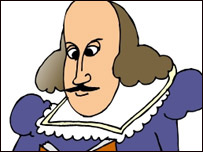Take Away English-William Shakespeare 威廉 沙士比亚
时间:2019-01-02 作者:英语课 分类:Take Away English

The Bard 1 - William Shakespeare
Of all the famous English writers, probably the best known is William Shakespeare.
He was born in Stratford-upon-Avon in 1564 on April the 23rd. His father was an important man in town so Shakespeare had a good upbringing. Shakespeare probably went to school (although no records survive to prove this) but not university. He got married when he was 18 to Anne Hathaway and the couple had 3 children.
Shakespeare wrote 38 plays and 154 sonnets 2 (a sonnet 3 is a kind of poem). He began working in his home town of Stratford but by 1592 was writing in London. He became rich enough to buy a house in the capital and one in Stratford.
He wrote sad stories called tragedies, like Romeo and Juliet, funny stories or comedies, romantic stories and stories about historical figures such as Julius Caesar.
Shakespeare died on his birthday in 1616, almost 400 years ago. But why is his work still popular today?
His work looked at common human themes, such as betrayal 4, murder, lust 5, power, ambition and love. These themes are as much a part of human nature today as they were all those years ago and are the themes we see in modern soap operas and Hollywood films. Even though his theatre, The Globe, burned down in 1613 it was rebuilt in London in 1997 and you can still see his plays performed there today.
Shakespeare's influence on the English language can still be felt today. We talk about "fair play", meaning honest behaviour but this phrase was first used by Shakespeare. He coined the phrase "you can have too much of a good thing". And it was Shakespeare who came up with the expression to disappear "into thin air" which we still use today when we lose something.
Shakespeare’s work has been translated into every major language in the world. And perhaps we'll still be as fascinated 6 by his work 400 years from now
as we've been for the last 400.
GLOSSARY 词汇表
best known
最有名的
survive
存活
plays
戏剧
comedies
喜剧
historical figures
历史人物
betrayal
背叛
ambition
雄心, 志气
theatre
剧院
influence
影响
coined the phrase
将一盛行已久的惯用语当作新鲜成语使用
upbringing
教育
couple
夫妻俩
poem
诗
romantic
浪漫的
common human themes
广泛大众题材
lust
欲望, 贪欲
soap operas
肥皂剧
rebuilt
重建
honest behaviour
正当的行为
translated
翻译
- I'll use my bard song to help you concentrate!我会用我的吟游诗人歌曲帮你集中精神!
- I find him,the wandering grey bard.我发现了正在徘徊的衰老游唱诗人。
- Keats' reputation as a great poet rests largely upon the odes and the later sonnets. 作为一个伟大的诗人,济慈的声誉大部分建立在他写的长诗和后期的十四行诗上。 来自《简明英汉词典》
- He referred to the manuscript circulation of the sonnets. 他谈到了十四行诗手稿的流行情况。 来自辞典例句
- The composer set a sonnet to music.作曲家为一首十四行诗谱了曲。
- He wrote a sonnet to his beloved.他写了一首十四行诗,献给他心爱的人。
- Any deviation from the party's faith is seen as betrayal.任何对党的信仰的偏离被视作背叛。
- His defection to the other side was the ultimate betrayal.他变节投向另一方是最终的背叛。
- He was filled with lust for power.他内心充满了对权力的渴望。
- Sensing the explorer's lust for gold, the chief wisely presented gold ornaments as gifts.酋长觉察出探险者们垂涎黄金的欲念,就聪明地把金饰品作为礼物赠送给他们。
- China has always fascinated me. 中国一直令我心驰神往。
- The children watched, fascinated, as the picture began to appear. 电影开始以后孩子们入迷地观看着。